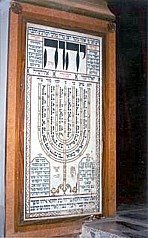Next Year, Anywhere But in Grim Baghdad
 Plaque inside Baghdad's last synagogue. Only a handful of Jews remain in Baghdad, the end of a community stretching back 2600 years.
Plaque inside Baghdad's last synagogue. Only a handful of Jews remain in Baghdad, the end of a community stretching back 2600 years.BAGHDAD, Oct. 2 -- As the sun set on the holiest day on the Jewish calendar Monday night, the last rabbi in Baghdad sat down for his last Yom Kippur dinner in Iraq: a piece of cake and two glasses of milk.
Yom Kippur, the Jewish day of atonement, begins with fasting and ends with a celebratory feast. But there was, Emad Levy confessed, very little to celebrate this year.
Today, barely a dozen members of the 2,600-year-old Jewish community in Baghdad remain to observe Yom Kippur. Most are afraid to gather for holidays, and besides, they figure, how can one rejoice in a place like this?
Emad Levy sat alone in his home on Monday night picking at a dessert-as-dinner, with vicious sectarian killings serving as the background music to the holiday. He had just finished chanting the hopeful lines at the end of the Yom Kippur service, he recalled in a phone interview.
"May we be sealed," he sang plaintively in his bedroom, "for a good year in the book of life."
Levy knows his prayers for peace will not be fulfilled in Iraq. Although the bloodshed plunging this country into a civil war has mainly claimed the lives of Sunni Arabs and Shiite Muslims, no group is more terrified -- or a more vulnerable target -- than the tiny Jewish community.
The capital's only remaining synagogue, a pink and yellow building with no identifying marks, has been boarded up since it was denounced more than three years ago as "the place of the Zionists." Most Jews barely leave their homes at all for fear of being kidnapped or executed. And even Levy will not directly mention Israel on the telephone, just because he never knows who might be eavesdropping.
"It's like I'm living in a prison all the time," said Levy, who is 41. "I have no future here. I must go out to have a life for myself."
Even for the long-suffering Jewish people, exiled to Babylon in what is now central Iraq 26 centuries ago by Nebuchadnezzar, the current conflict here has become unbearable. Levy's family survived the increasing anti-Semitic attacks after the founding of Israel in 1948; the 1969 execution of about a dozen Jews accused of spying for the Jewish state; and incessant spying by Saddam Hussein's regime.
After the 2003 U.S.-led invasion, though, Levy's father fled to Israel. Levy planned to leave, too, but remained in Iraq to take care of an ailing Jewish octogenarian with diabetes. Now the sick man is staying with friendly Kurds, and Levy plans to leave as soon as he can sell his house.
Read the rest at the Washington Post

<< Home